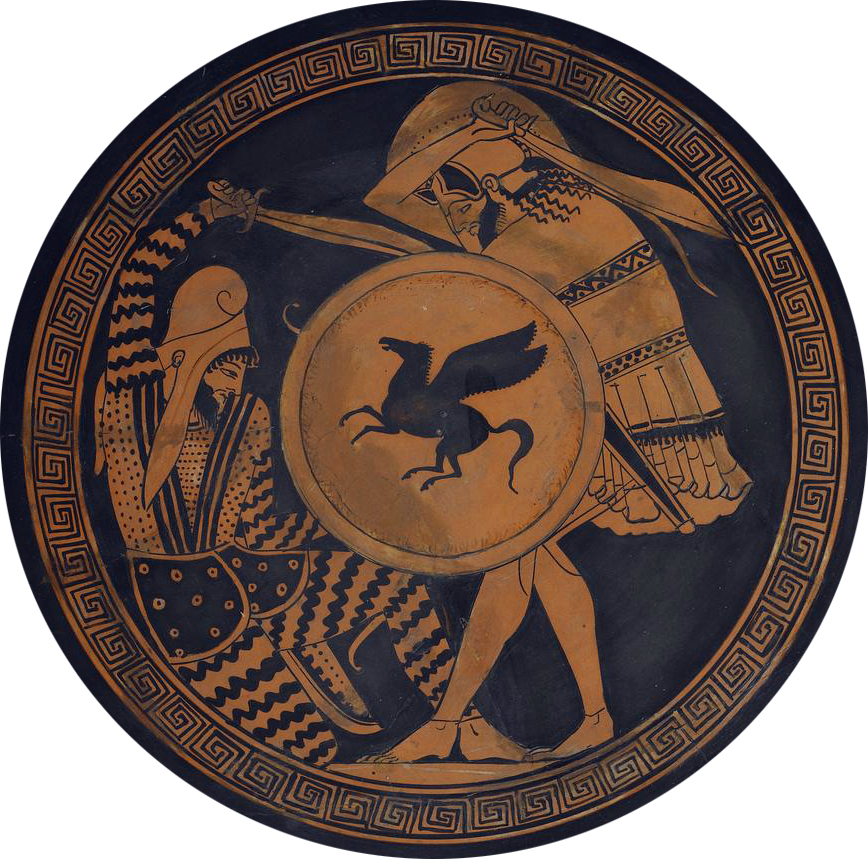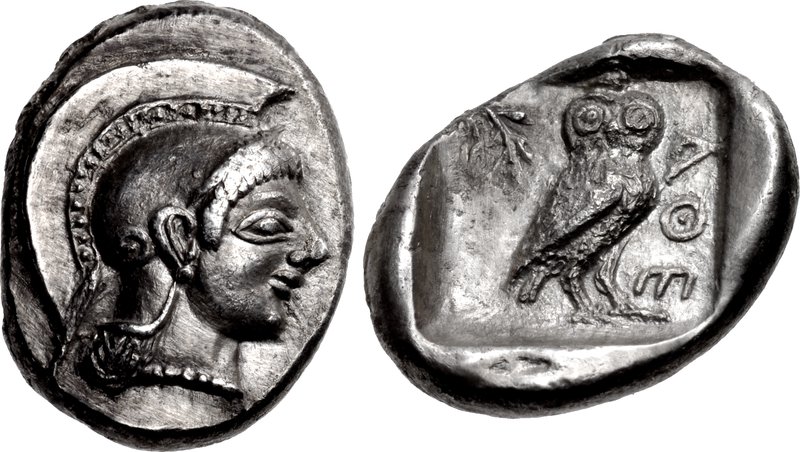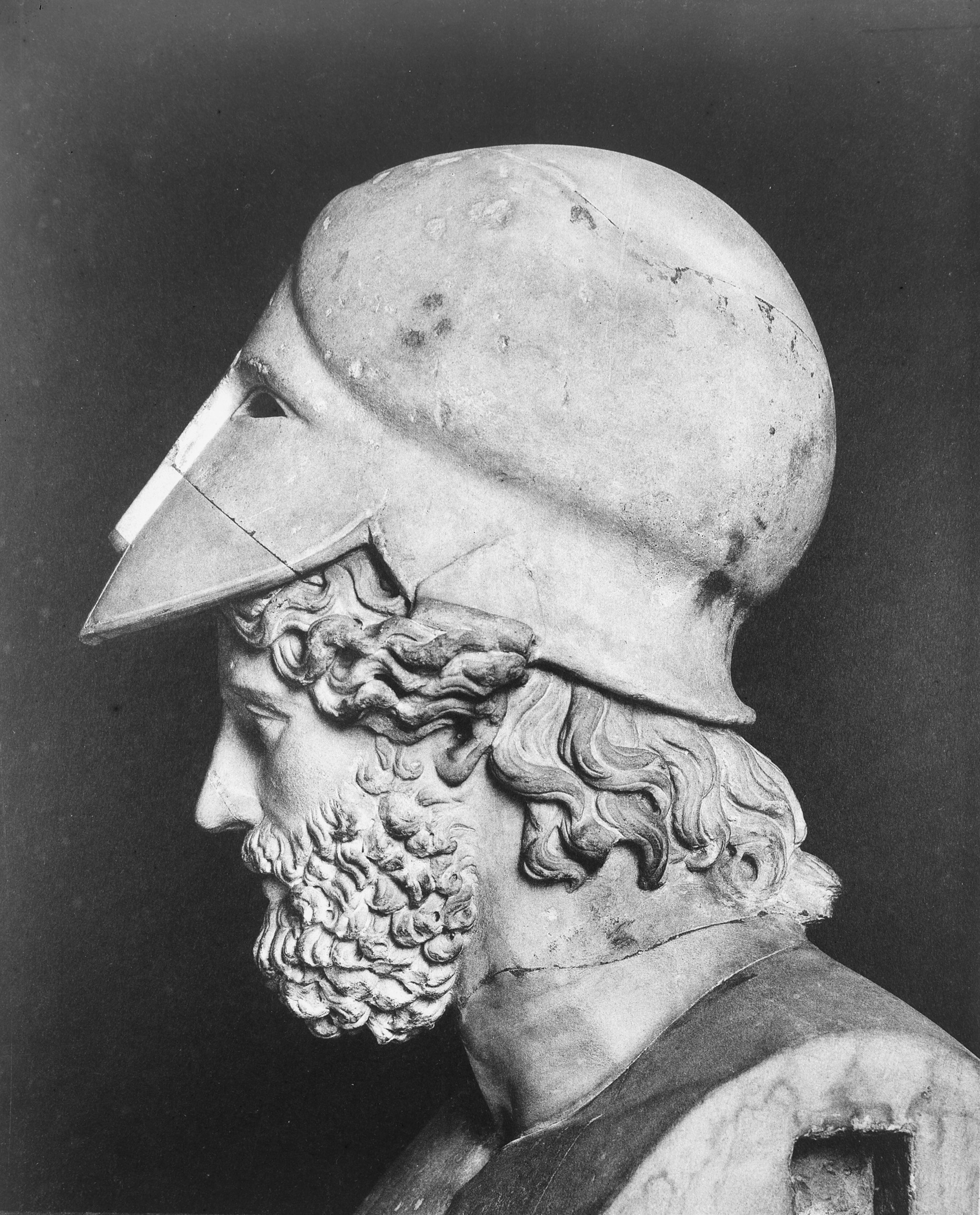|
Xanthippus
Xanthippus (; el, Ξάνθιππος, ; c. 525-475 BC) was a wealthy Athenian politician and general during the early part of the 5th century BC. His name means "Yellow Horse." He was the son of Ariphron and father of Pericles. A marriage to Agariste, niece of Cleisthenes, linked Xanthippus with the Alcmaeonid clan, whose interests he often represented in government. He distinguished himself in the Athenian political arena, championing the aristocratic party. His rivalry with Themistocles led to his ostracism, but he was recalled from exile when the Persians invaded Greece. Xanthippus' actions in the ensuing Greco-Persian Wars contributed significantly to the victory of the Greeks and the subsequent ascendancy of the Athenian Empire. Early political career and ostracism As a citizen-soldier of Athens and a member of the aristocracy, Xanthippus most likely fought during the Battle of Marathon in 490 BC. He first appears in the historical record the following year (489 BC), head ... [...More Info...] [...Related Items...] OR: [Wikipedia] [Google] [Baidu] |
Pericles
Pericles (; grc-gre, Περικλῆς; c. 495 – 429 BC) was a Greek politician and general during the Golden Age of Athens. He was prominent and influential in Athenian politics, particularly between the Greco-Persian Wars and the Peloponnesian War, and was acclaimed by Thucydides, a contemporary historian, as "the first citizen of Athens".Thucydides, 2.65 Pericles turned the Delian League into an Athenian empire and led his countrymen during the first two years of the Peloponnesian War. The period during which he led Athens, roughly from 461 to 429 BC, is sometimes known as the "Age of Pericles", but the period thus denoted can include times as early as the Persian Wars or as late as the following century. Pericles promoted the arts and literature, and it is principally through his efforts that Athens acquired the reputation of being the educational and cultural center of the ancient Greek world. He started an ambitious project that generated most of the surviving stru ... [...More Info...] [...Related Items...] OR: [Wikipedia] [Google] [Baidu] |
Battle Of Mycale
The Battle of Mycale ( grc, Μάχη τῆς Μυκάλης; ''Machē tēs Mykalēs'') was one of the two major battles (the other being the Battle of Plataea) that ended the second Persian invasion of Greece during the Greco-Persian Wars. It took place on or about August 27, 479 BC on the slopes of Mount Mycale, on the coast of Ionia, opposite the island of Samos. The battle was fought between an alliance of the Greek city-states, including Sparta, Athens and Corinth, and the Persian Empire of Xerxes I. The previous year, the Persian invasion force, led by Xerxes himself, had scored victories at the battles of Thermopylae and Artemisium, and conquered Thessaly, Boeotia and Attica; however, at the ensuing Battle of Salamis, the allied Greek navies had won an unlikely victory, and therefore prevented the conquest of the Peloponnese. Xerxes then retreated, leaving his general Mardonius with a substantial army to finish off the Greeks the following year. In the summer of 479 BC, ... [...More Info...] [...Related Items...] OR: [Wikipedia] [Google] [Baidu] |
Alcmaeonidae
The Alcmaeonidae or Alcmaeonids ( grc-gre, Ἀλκμαιωνίδαι ; Attic: ) were a wealthy and powerful noble family of ancient Athens, a branch of the Neleides who claimed descent from the mythological Alcmaeon, the great-grandson of Nestor. In the 7th through 5th centuries BC, the Alcmaeonidae played a significant role in the developments and events that occurred in Athens. Such developments included overthrowing an Athenian tyrant, helping to lay the foundations of Athenian democracy, and having generals for Athens during the Peloponnesian War. The Alcmaeonidae were mentioned frequently throughout Herodotus' '' The Histories'', and many played a key role in shaping Athens. The first prominent Alcmaeonid was Megacles, who was exiled from the city and given a curse on him and his family. Furthermore, there was Cleisthenes, who became known as "the father of Athenian democracy" by numerous scholars and historians. Another famous Alcmaeonid was Pericles, whom Thucydides woul ... [...More Info...] [...Related Items...] OR: [Wikipedia] [Google] [Baidu] |
Ostracism
Ostracism ( el, ὀστρακισμός, ''ostrakismos'') was an Athenian democratic procedure in which any citizen could be expelled from the city-state of Athens for ten years. While some instances clearly expressed popular anger at the citizen, ostracism was often used preemptively. It was used as a way of neutralizing someone thought to be a threat to the state or potential tyrant, though in many cases popular opinion often informed the choice regardless. The word "ostracism" continues to be used for various cases of social shunning. Procedure The name is derived from the pottery shards that were used as voting tokens, called ''ostraka'' (singular ''ostrakon'', ) in Greek. Broken pottery, abundant and virtually free, served as a kind of scrap paper (in contrast to papyrus, which was imported from Egypt as a high-quality writing surface, and was thus too costly to be disposable). Each year the Athenians were asked in the assembly whether they wished to hold an ostracis ... [...More Info...] [...Related Items...] OR: [Wikipedia] [Google] [Baidu] |
Greco-Persian Wars
The Greco-Persian Wars (also often called the Persian Wars) were a series of conflicts between the Achaemenid Empire and Greek city-states that started in 499 BC and lasted until 449 BC. The collision between the fractious political world of the Greeks and the enormous empire of the Persians began when Cyrus the Great conquered the Greek-inhabited region of Ionia in 547 BC. Struggling to control the independent-minded cities of Ionia, the Persians appointed tyrants to rule each of them. This would prove to be the source of much trouble for the Greeks and Persians alike. In 499 BC, the tyrant of Miletus, Aristagoras, embarked on an expedition to conquer the island of Naxos, with Persian support; however, the expedition was a debacle and, preempting his dismissal, Aristagoras incited all of Hellenic Asia Minor into rebellion against the Persians. This was the beginning of the Ionian Revolt, which would last until 493 BC, progressively drawing more regions of Asia Minor into the co ... [...More Info...] [...Related Items...] OR: [Wikipedia] [Google] [Baidu] |
Cleisthenes
Cleisthenes ( ; grc-gre, Κλεισθένης), or Clisthenes (c. 570c. 508 BC), was an ancient Athenian lawgiver credited with reforming the constitution of ancient Athens and setting it on a democratic footing in 508 BC. For these accomplishments, historians refer to him as "the father of Athenian democracy." He was a member of the aristocratic Alcmaeonid clan. He was the younger son of Megacles and Agariste making him the maternal grandson of the tyrant Cleisthenes of Sicyon. He was also credited with increasing the power of the Athenian citizens' assembly and for reducing the power of the nobility over Athenian politics. In 510 BC, Spartan troops helped the Athenians overthrow the tyrant Hippias, son of Peisistratus. Cleomenes I, king of Sparta, put in place a pro-Spartan oligarchy headed by Isagoras. But his rival Cleisthenes, with the support of the middle class and aided by democrats, took over. Cleomenes intervened in 508 and 506 BC, but could not stop Cleisthenes and ... [...More Info...] [...Related Items...] OR: [Wikipedia] [Google] [Baidu] |
Themistocles
Themistocles (; grc-gre, Θεμιστοκλῆς; c. 524–459 BC) was an Athenian politician and general. He was one of a new breed of non-aristocratic politicians who rose to prominence in the early years of the Athenian democracy. As a politician, Themistocles was a populist, having the support of lower-class Athenians, and generally being at odds with the Athenian nobility. Elected archon in 493 BC, he convinced the polis to increase the naval power of Athens, a recurring theme in his political career. During the first Persian invasion of Greece he fought at the Battle of Marathon (490 BC) and was possibly one of the ten Athenian ''strategoi'' (generals) in that battle. In the years after Marathon, and in the run-up to the second Persian invasion of 480–479 BC, Themistocles became the most prominent politician in Athens. He continued to advocate for a strong Athenian Navy, and in 483 BC he persuaded the Athenians to build a fleet of 200 triremes; these prove ... [...More Info...] [...Related Items...] OR: [Wikipedia] [Google] [Baidu] |
Ariphron
Ariphron (; Gr. ) was the name of several people from ancient Greek history: *Ariphron, the father of Xanthippus, and grandfather of Pericles, both prominent Athenian statesmen. He was associated with the Alcmaeonid family. *Ariphron, the brother of Pericles. *Ariphron of Sicyon, a Greek poet, and the author of a paean to health (), which has been preserved by Athenaeus. The beginning of the poem is quoted by Lucian and Maximus of Tyre. It is also printed in Bergk's ''Poetae Lyrici Graeci''.Theodor Bergk Theodor Bergk (22 May 181220 July 1881) was a German philologist, an authority on classical Greek poetry. Biography He was born in Leipzig as the son of Johann Adam Bergk. After studying at the University of Leipzig, where he profited by the ins ..., ''Poetae Lyrici Graeci'' p. 841 *Ariphron, an Archon of Athens, reigning in the 9th century BC. References {{authority control Ancient Athenians Ancient Greek poets Ancient Greek writers known only from secondary so ... [...More Info...] [...Related Items...] OR: [Wikipedia] [Google] [Baidu] |
Eponymous Archon
In ancient Greece the chief magistrate in various Greek city states was called eponymous archon (ἐπώνυμος ἄρχων, ''epōnymos archōn''). "Archon" (ἄρχων, pl. ἄρχοντες, ''archontes'') means "ruler" or "lord", frequently used as the title of a specific public office, while "eponymous" means that he gave his name to the year in which he held office, much like the Roman dating by consular years. In Classical Athens, a system of nine concurrent archons evolved, led by three respective remits over the civic, military, and religious affairs of the state: the three office holders were known as the eponymous archon, the polemarch (πολέμαρχος, "war ruler"), and the archon basileus (ἄρχων βασιλεύς, "king ruler"). The six others were the thesmothetai, judicial officers. Originally these offices were filled from the wealthier classes by elections every ten years. During this period the eponymous archon was the chief magistrate, the polema ... [...More Info...] [...Related Items...] OR: [Wikipedia] [Google] [Baidu] |
Battle Of Marathon
The Battle of Marathon took place in 490 BC during the first Persian invasion of Greece. It was fought between the citizens of Athens, aided by Plataea, and a Persian force commanded by Datis and Artaphernes. The battle was the culmination of the first attempt by Persia, under King Darius I, to subjugate Greece. The Greek army inflicted a crushing defeat on the more numerous Persians, marking a turning point in the Greco-Persian Wars. The first Persian invasion was a response to Athenian involvement in the Ionian Revolt, when Athens and Eretria sent a force to support the cities of Ionia in their attempt to overthrow Persian rule. The Athenians and Eretrians had succeeded in capturing and burning Sardis, but they were then forced to retreat with heavy losses. In response to this raid, Darius swore to burn down Athens and Eretria. According to Herodotus, Darius had his bow brought to him and then shot an arrow "upwards towards heaven", saying as he did so: "Zeus, that it may b ... [...More Info...] [...Related Items...] OR: [Wikipedia] [Google] [Baidu] |
Sparta
Sparta ( Doric Greek: Σπάρτα, ''Spártā''; Attic Greek: Σπάρτη, ''Spártē'') was a prominent city-state in Laconia, in ancient Greece. In antiquity, the city-state was known as Lacedaemon (, ), while the name Sparta referred to its main settlement on the banks of the Eurotas River in Laconia, in south-eastern Peloponnese. Around 650 BC, it rose to become the dominant military land-power in ancient Greece. Given its military pre-eminence, Sparta was recognized as the leading force of the unified Greek military during the Greco-Persian Wars, in rivalry with the rising naval power of Athens. Sparta was the principal enemy of Athens during the Peloponnesian War (431–404 BC), from which it emerged victorious after the Battle of Aegospotami. The decisive Battle of Leuctra in 371 BC ended the Spartan hegemony, although the city-state maintained its political independence until its forced integration into the Achaean League in 192 BC. The city nevertheless ... [...More Info...] [...Related Items...] OR: [Wikipedia] [Google] [Baidu] |
Pausanias (general)
Pausanias ( grc-gre, Παυσανίας; died c. 477 BC) was a Spartan regent and a general. In 479 BC, as a leader of the Hellenic League's combined land forces, Pausanias won a pivotal victory in the Battle of Plataea ending the Second Persian invasion of Greece. One year after the victories over the Persians and the Persians' allies, Pausanias fell under suspicion of conspiring with the Persian king, Xerxes I to betray Greeks and died in 477 BC in Sparta starved to death by fellow citizens. What is known of his life is largely according to Thucydides' ''History of the Peloponnesian War'', Diodorus' ''Bibliotheca historica'' and a handful of other classical sources. Early life Pausanias like all Spartan citizens (Spartiate), would have gone through intense training from the age of seven and was required to be a regular soldier until the age of thirty. Pausanias was from the royal house of the Agiads. Yet this did not exempt him from going through the same training as every o ... [...More Info...] [...Related Items...] OR: [Wikipedia] [Google] [Baidu] |









